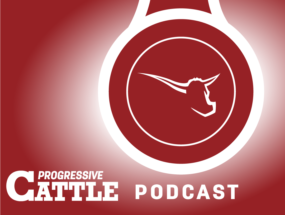The old flatbed pickup crept along in granny gear as I walked alongside it, valiantly and vainly trying to flake off 5- or 6-inch sections of one of the 1,600-pound square hay bales lying on its side on the bed of the truck. I was feeding a bale from the top of an uncovered stack, and the moisture from a serious winter’s worth of snow had seeped a good 12 inches or more into the top of the bales. The diminished feed value of my hay was the least of my worries. My quarrel on this day was with my old nemesis, Old Man Winter. It was well into March and a week or two past the time I’d expected to still be fighting this battle, but the bitter cold temperatures resulted in frozen bales that refused to cooperate come feeding time. If I was lucky enough to get the pitchfork tines stuck into the bale's frozen surface, it was a whole other matter getting a chunk of hay to flake off.
As I struggled and cussed and cussed and struggled, I eventually noticed some progress, albeit very slow progress. As we slowly made our way across the field, the dozens of cows milling around the truck, eager to grab a bite of hay before it hit the ground, were a testament to the tediousness of the project. Nearly half of the first bale had finally found its way off the bed of the truck, and I was beginning to believe I might get the chore finished before I had to be rescued by summertime. With my newfound glimmer of confidence, I made a mighty thrust with the pitchfork and sunk the tines deep into the frozen surface of the bale about a half foot from the edge I was feeding from. I braced my feet on the ground against a frozen cow pie to gain some leverage and shoved with all I had. A big chunk of bale broke loose all right, but it wasn’t in the spot I had planned. A 3-foot section of frozen alfalfa busted loose and tipped over onto the truck bed. As it fell, the force of the fall jerked the pitchfork handle from my hands and sent me sprawling backward. As the chunk of hay and I simultaneously fell, the handle of the pitchfork caught me square under the chin.
Like Yosemite Sam in a Saturday morning cartoon from the days of genuine quality animated TV programming, I sat on the ground for a few seconds as the stars and chirping birds circled around my head. The first thing I thought to do was to feel my chin and jaw to determine if everything was still intact. I couldn’t detect any blood, so I figured I hadn’t split anything up too badly. That was a good thing, since I have an almost irrational disdain for stitches. My chin and jaw hurt like none other, but my next order of business was to check for teeth. With my tongue, I could feel a tiny, gritty chunk of a molar that had broken loose, but in fairly short order I determined that all my teeth were still in the same spots where they’d started the day. As much as I pitied myself at that moment, I was quite certain I’d live to feed another day. I was pretty sore for several days but really no worse for the wear.
A few days later, I was trading cow war stories with a couple of my neighbors who were languishing through the same winter as I was. Ryan emphatically declared that frozen ton bales of straw and hay had a special, awful place reserved for them in the hereafter. We’ll see how long they can keep their frozen status in the place where they’ll be stored. Seth lamented that he’d lost three calves over the last 24 hours due to the snow and cold. Sadly, I could relate to him. It somehow gave me comfort to commiserate with someone who could understand my woes.
My first thought was that misery surely does love company. Isn’t it nice to know that someone else has to suffer, too? Later that evening, as I thought about the conversation, though, I decided that my reckoning on the matter was actually quite shallow. What a dim view of life it is to revel in someone else’s misfortune, regardless of my own headaches and heartaches. I wouldn’t want my good neighbors to suffer a loss of any kind any more than I would wish it upon myself. It was then that I figured out how easy it is to turn sorrow, sadness or misery on its head. It’s called empathy.
Empathy is much more than commiserating with someone and languishing with them in a pit of sorrow and self-pity. Empathy is genuine charity, and it can pick us up out of that pit of grief or despair. With true empathy, we can lift others and be lifted ourselves and consequently rise above our circumstances. And rest assured – it’s a much better view from there.








